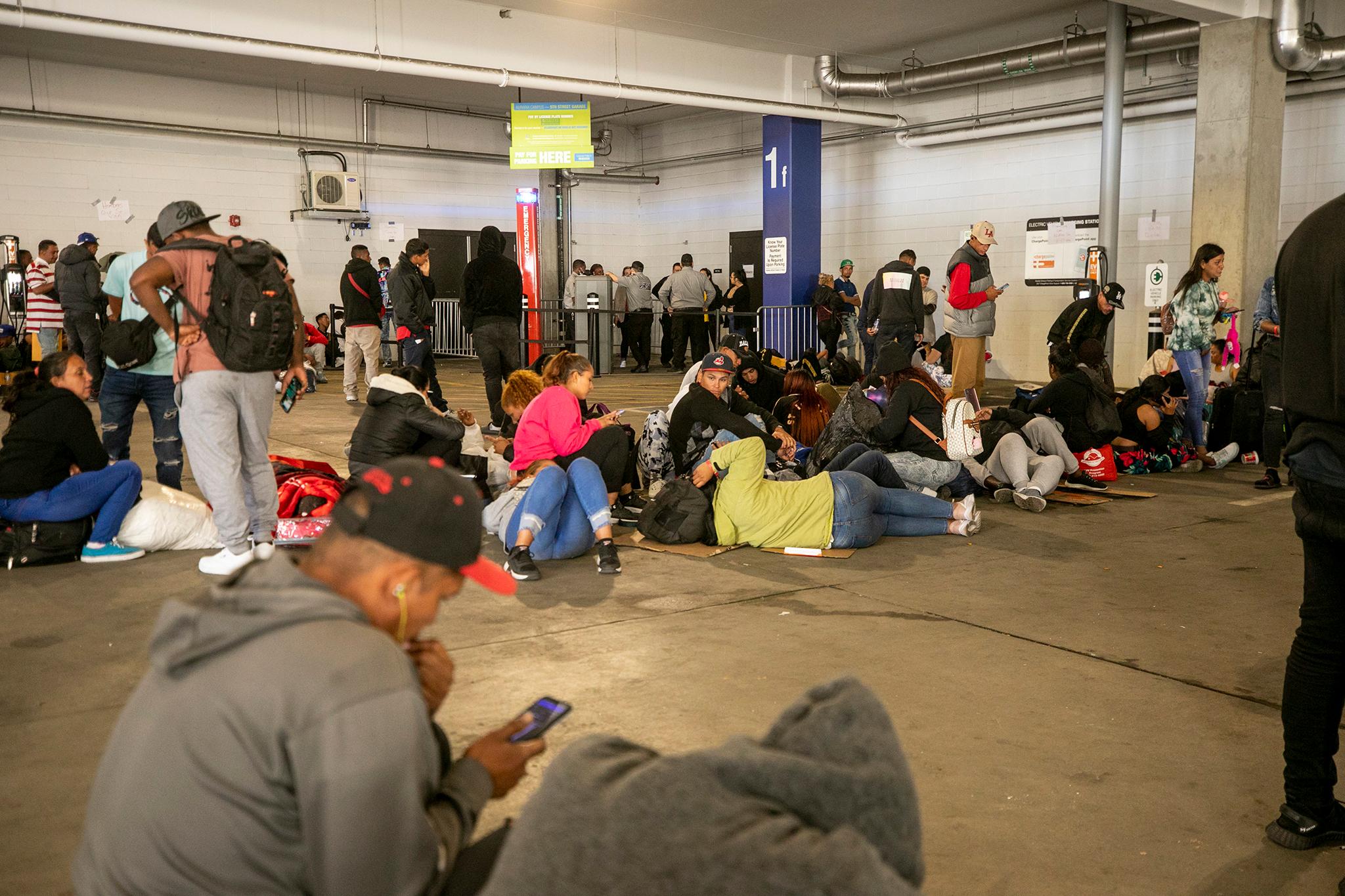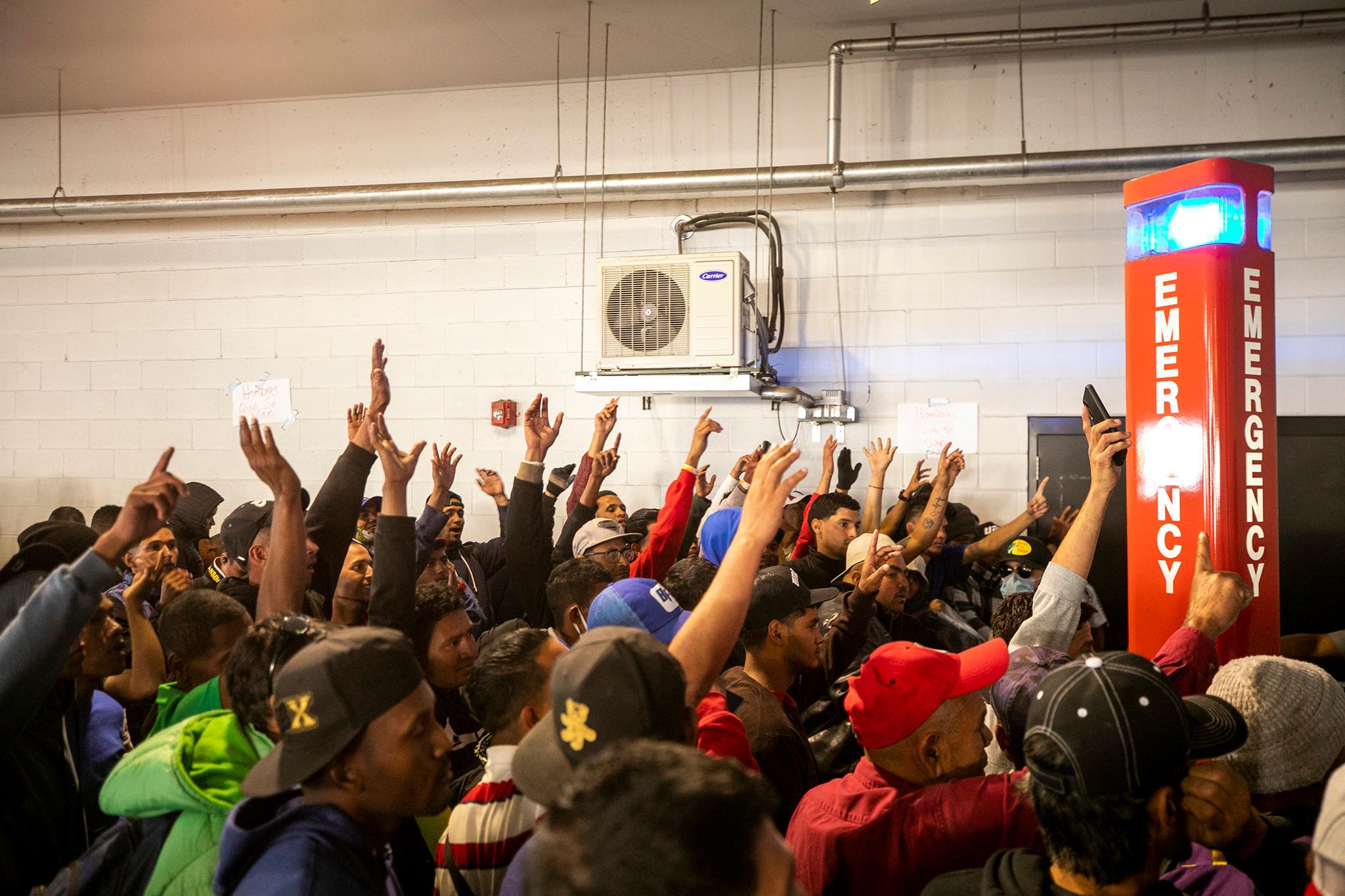The faces of weary travelers and chatter filled a cold Denver parking garage while recently arrived migrants sat or stood waiting in line for bus tickets to somewhere in the U.S.
Many had light sweaters, sneakers and hats donning Nike, NBA or MLB sports teams. Some sat on the floor, others used their backpacks as seat cushions or sprawled across cardboard. Even more sat outside on sidewalks and patches of grass, taking in the Denver sunshine.
"Many people. That's ugly right now," said 23-year-old Keiver Rojas, describing the condition of El Paso, Texas, where he came from. "And the heat, incredible! Even worse. Here it is better."
Hundreds of migrants, mostly from Venezuela, have arrived in Denver since late last week. In response, the city is planning to reactivate the Joint Information Center and the Emergency Operations Center Thursday morning to assist newly arrived migrants, according to a statement from the city of Denver and confirmation from a spokesperson for Mayor Michael Hancock's office.
The centers were activated last December as the city sought to coordinate its response and provide updates about the number of people arriving. It was also activated in 2021, as the city tried to increase access to the COVID-19 vaccine in communities of color.

More than 200 migrants have arrived per day since last week. That is a massive increase compared to the 20-30 arriving daily through March and April.
Rojas and his daughter, Samantha, are among those new arrivals. He said they are headed to California after leaving behind his wife and two-year old daughter in Venezuela with hopes of bringing them as soon as he is able.
"Thank God we are here. We're looking for a way to get on the bus, which supposedly they're giving free tickets. I don't know anything yet because we just arrived."
Rojas, like many others Denverite spoke to at a parking garage near downtown, had just arrived no more than 20 minutes ago from a bus chartered out of El Paso. Bus tickets cost everyone $90 and Rojas had to sell candy in El Paso to afford the tickets.
"Since I really had no one to help me, I had to go out there to sell candy. I had to go out with my daughter to find a way to get out of that state."
Everyone that we spoke to came from Venezuela, traveling anywhere from six to nine months, passing through a number of countries. They showed us pictures of them atop the "La Bestia," a cargo, non-passenger train network that runs from southern Mexico to the U.S. border that many migrants use to reach their destination, though travelers who use it often face extortion from organized crime rings that patrol the routes. They also showed photos of the treacherous Darien Jungle between Colombia and Panama.
"It is one of the most dangerous jungles in the world where many people die," Tovar said, recounting the most memorable parts of their nine-month journey.

Everyone Denverite spoke to said they had no plans to stay in Denver, but the sudden increase could complicate things for the city.
Raison Isturdi and Tovar are both headed to Las Vegas. They plan to meet with friends who have been in the U.S. for five years.
They joined a group along the way made up of five adults and four children and had also just arrived. They were all resting before jumping into all of the commotion inside for information on what to do next on their journey.
Isturdi and Tovar had been working in Juarez, Mexico for five months while waiting for an appointment with immigration officials. Then desperation kicked in once they heard about the imminent expiration of the Trump-era COVID policy, Title 42, which allows federal immigration authorities to quickly expel people back across the border. When asked what they knew about the policy and its coming expiration, Isturdi said:
"Don't believe anything I tell you, I'm just going to tell you what I've heard on the street," Isturdi prefaced. "They have told me that Title 42 will be lifted and a new Title will apply where migrants will be deported to their country of origin - no longer to Mexico but to the country where one is from."
The consensus among people Denverite spoke to is that everyone was advised to cross the border before Title 42 expires. One of the main reasons is that deportation to faraway home countries, such as Venezuela as opposed to being sent to Mexico, would mean losing all the effort and progress it took to reach the U.S.-Mexico border.

"We already completed our goal, which was to get here," Marllenis Rebas said. Rebas, her partner Johnathan Barreto, Lisbeth Abreu and Jusmari Lopez are all Venezuelan migrants headed to Chicago via bus this afternoon.
Denver Department of Human Services spokesperson Victoria Aguilar said the agency anticipated an increase in migrants with the upcoming expiration of Title 42. The agency has been providing aid to arriving migrants since March, including buying bus tickets for migrants leaving Denver.
"It came a lot sooner than expected, and it came in much more volume than what we expected," Aguilar said. "And we know that we're responding to a crisis and that things evolve and change, but I don't think we were ever expecting this large amount of surge this soon."

That sudden increase comes with several complications, the main concern being shelter space. While a building near the parking garage has been opened as an overnight shelter, the city is in desperate need of more beds.
"We are calling for faith-based community facilities, nonprofit facilities, basically anybody who may have opportunity and space to shelter overnight migrants, to please reach out to the city for that partnership," Aguilar said. "I know that at the moment, we are sheltering over 800 within our city system."
Rudy Gonzalez, president and CEO of Servicios de la Raza, a Denver-based nonprofit that's been assisting newly arrived migrants, said he can't see the end of when migrants will stop arriving in Denver for assistance.
"As long as we have a racist immigration system in place, as long as we have an oppressive system in place, as long as we do not acknowledge the worth and value of our migrants who come to this country, and the fact that they want to work, and they want to do the jobs that many American citizens of this country won't do, then we're going to continue to have that problem," he said.

Money could also become an issue.
Assisting newly arrived migrants comes at a cost for everyone involved. The state of Colorado and the city of Denver have spent a combined $14 million since December 2022 on shelter, food and other forms of migrant support.
Governor Jared Polis and Mayor Hancock asked Secretary of Homeland Security Alejandro Mayorkas to bolster funding for migrant support programs in anticipation of Title 42's expiration.
"We believe more can be done to make funding and programs fit the needs of local jurisdictions, especially those in the interior. As DHS further shapes the [Shelter and Services Program], we urge both moving with all deliberate speed and making needed modifications to the program," a joint letter said.
In December, Polis and Hancock, in partnership with the Rose Community Foundation, launched a new fund to assist migrants. Sarah Kurz, a spokesperson for Rose Community Foundation, said they've raised $460,000, which has been distributed to various nonprofits.
"The city government and the state government can only do so much, and we really need nonprofits on the ground helping welcome folks," Kurz said.

For people who recently arrived, despite short stints in Denver, some have found a helping hand.
Freider Herrera, 21, who arrived Sunday morning, said he's often mistaken for being Haitian, Dominican or Cuban by other migrants he's met along the way.
"Because of my [skin] color, sometimes because of the way I speak and the type of hair I have," Herrera said.
He's actually from a small coastal town in Venezuela. He arrived in El Paso on Thursday and purchased his bus ticket to Denver, arriving on Sunday morning. Tomorrow morning he's catching another bus to Minneapolis.

Many of the migrants we spoke to were grateful for their reception in Denver, commenting on the generosity of city officials and the ease with which they have had in securing free bus tickets to their desired destinations. For Herrera, eating a basic meal is what he's most grateful for.
"It's been about three weeks without rice, steak, nothing like that," Herrera said.
The other day however, he was walking by McDonald's looking for a cardboard box to sleep on when a man approached him and offered to buy him food.
"He took me inside McDonald's and invited me to eat," Herrera said. Herrera knows a little bit of English but also said the man spoke Spanish. "He socialized with me, and he was surprised by everything I told him. Here in Denver, my congratulations to the government and to all of you for being so supportive of us."
Editor's note: This article has been updated with the detail that city plans to activate its Emergency Operations Center and Joint Information Center on Thursday morning. It has also been updated to correct a formatting error that cut a section about the train route known as "La Bestia."













